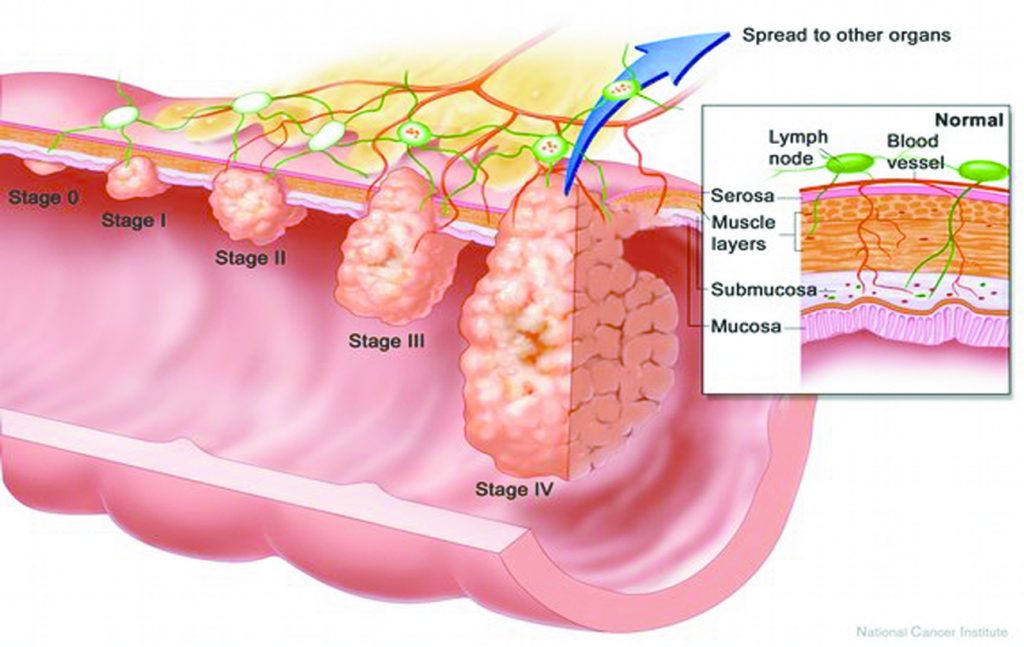By Vipul Patel, MD – Medical Oncologist at Florida Cancer Specialists
 As an oncologist, I know how a cancer diagnosis changes everything – not only for the patient, but also for his/her family and close friends. That is one reason why I want to spread the word that finding cancer at an early, or even pre-
As an oncologist, I know how a cancer diagnosis changes everything – not only for the patient, but also for his/her family and close friends. That is one reason why I want to spread the word that finding cancer at an early, or even pre-
cancerous, stage can make a huge difference in the outcomes for patients. There are many screenings or tests that can detect cancer at an early stage, including several for colorectal cancer.
According to the American Cancer Society (ACS), colorectal cancer is the third leading cause of cancer-related deaths in women in the United States and the second leading cause of cancer deaths in men. However, the number of deaths from colorectal cancer has been dropping steadily in both men and women for several decades. One of the reasons for this decline is early detection. ACS guidelines recommend that, starting at age 50, people who are not at an increased risk due to family history, get a screening for colorectal cancer.
March is Colorectal Cancer Awareness Month
Almost all colorectal cancers begin as precancerous polyps (abnormal growths) in the colon or rectum. Most polyps take 10-15 years before developing into cancer and they may not cause any symptoms until the cancer is well-established. That’s why screening is so important. With regular screenings, most polyps can be found and removed before they turn into cancer, therefore preventing cancer from occurring. Screenings can also find colorectal cancer at an early stage, where there is a greater chance that treatment will be most effective and may even result in a cure.
If there are any symptoms, they may include blood in your stool, stomach pain or cramps that don’t go away or unexplained weight loss; however, these symptoms can also signal other conditions unrelated to cancer. Only a screening can determine whether the cause of these symptoms could be cancer. Talk with your doctor about which screening is right for you – and which you are most likely to use.
There are several types of screenings for colorectal cancer, including:
• Stool Tests – to detect blood in the stool. Most of these tests can be performed in your home.
• Flexible Sigmoidoscopy – Your doctor will check for polyps or cancer inside the rectum and the lower third of your colon.
• Colonoscopy – Your doctor will check for polyps or cancer inside the rectum and your entire colon. During the test, the doctor can also remove most polyps and some cancers if they are found.
Risk Factors
Although it is not a certainty, family history is one of the greatest risk factors for many types of cancer. If you have a family history of colorectal polyps or cancer, you may want to begin screening earlier than age 50, or even receive genetic counseling to review your family medical history. Other risk factors include inflammatory bowel disease, such as Crohn’s disease or ulcerative colitis, and certain genetic syndromes, such as familial adenomatous polyposis (FAP) or hereditary non-polyposis colorectal cancer, also known as Lynch Syndrome. If you have any of these conditions, talk with your doctor about how to reduce your risk. Research is also underway to learn if lifestyle choices such as diet and exercise can also reduce your risk of colorectal cancer.
If everyone over age 50 had regular screenings to detect pre-cancerous polyps, we could reduce the incidence of this disease by about 50%. In addition to early detection, treatment for colorectal cancer has vastly improved over the last few decades. As a result, there are now more than a million survivors of colorectal cancer in the United States.
Summerfield ER
14193 S US HWY 441
Summerfield, FL 34491
ocalahealthsystem.com
Check Also
Recurrent UTIs: Addressing the Risk of Antibiotic Resistance
Urinary tract infections (UTIs) are common bacterial infections that affect millions of individuals worldwide each …
 Central Florida Health and Wellness Magazine Health and Wellness Articles of the Villages
Central Florida Health and Wellness Magazine Health and Wellness Articles of the Villages



